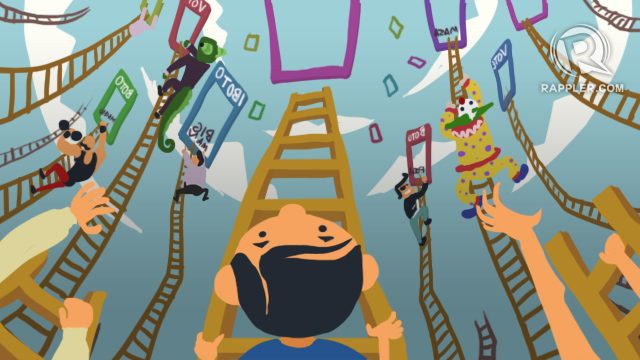SUMMARY
This is AI generated summarization, which may have errors. For context, always refer to the full article.

Toying with the idea of me becoming a politician someday thrills me. Perhaps, the term ‘toying’ is too mild of a word to describe my ambitions.
Yes, I’m that fond of politics.
I once watched Ninoy Aquino deliver a crisp and witty speech in front of a surprisingly large crowd. Everybody was laughing and clapping at the same time. I even saw my father smiling while watching Ninoy on TV, nodding- as if approving to every word the political icon uttered.
“Daddy. Bakit ang hilig mo sa pulitika?” I asked out of curiosity. (Why do you like politics so much?)
“Hindi kasi ako magaling sa math,” he’d joke. (I’m not good at math.)
“Tatakbo pala akong mayor pagtanda ko. Hindi rin kasi ako ganoon kagaling sa math,” I’d joke back. (I’m going to run for mayor when I grow up. I’m also not good at math.)
It’s hard growing up in a politically nurturing environment. The very fabric of politics creeps in your system and takes away everything else that is not related to government and administration. One day, you’ll just wake up craving for your own niche in the political scene. I guess that is what happened to me.
Being exposed to various political activities, I seemingly absorbed the idea of saving a country (or a municipality) from tragedy through politics, and politics alone.

At such a young age, I tried to engage myself in classroom elections and organizational or club meetings. I would then argue on who the better head of cleaners is in our classroom, the group’s designation on what part of the project they must do, and even on what should be posted weekly in the bulletin board of the English Club.
But I guess I was only good for one shot.
I lost when I ran for classroom president.
I really couldn’t accept that head scratching fact when it first hit me. I didn’t get it. Why did my classmates vote for someone only known for his looks and appeal than someone who already knows how to handle that particular class? I really did not see the logic in that.
But after watching a little television, the puzzle I fancy on solving finally displayed itself.
I remember Alan Peter Cayetano waving his red and shiny boxing gloves, trying to ‘punch’ his way in the senatorial slate. I remember Teofisto Guingona portraying a herculean physique, killing a symbol of corruption while boasting the lines “galit sa buwaya!” I even recall Franklin Drilon carrying a child in his arms while the words “ibalik ang big man sa senado” kept on playing in the background.
Apart from their ‘maka-masa’ approach, they all have one thing in common: they all won.
That was the day I realized one thing about Philippine politics. It was never about ideology alone. It was all about charisma, machismo, personality, and popularity.
No one truly cared about what platforms you have in your resume. Whether it be for change or for consistency, most people will only convince themselves on what they believe in and vote for the candidate with the most appealing character – technically the most popular.
The political environment in the Philippines right now requires constituency. It has been a game of riding the bandwagon, of numbers. You need people who like you for your personality and not for your ideology or how you deal with problems.
You can’t win an election in the Philippines unless you’re good at pacing yourself with the likes of other people.
“Daddy, ‘di po ba tumakbo kang vice mayor dati?” I remember asking my father. (Daddy, didn’t you run for vice mayor before?)
“Oo. Kaso talo ako. Kakaunti boto ko sa mga linang” he answered. (Yes, but I lost. Only a few voted for me.)
“Bakit naman po?” I asked, out of curiosity. (Why?)
“Mayabang at suplado kasi ako” he answered, smirking. (I was boastful and aloof.)
Whatever happened to real politics?
Our history books remind us of a once and so glorious country, where politicians were larger than life. From the Commonwealth era of Manuel L. Quezon to the reforms and projects initiated by the man with the iron fist himself, Ferdinand Marcos, the judgment of history has seemingly become unfair to the pioneers of true politics.
Politicians then were respected. Today? Most are a bunch of clowns trying to figure out how to keep the business going and keep our cursed political circus kicking.
Maybe it’s only fitting that we change this political scenery.
Some want to become politicians because they want to ‘serve the public’ with their vague intentions. Some want to have their names be fancied and famed by many. Some want to continue a so-called legacy, or dynasty left by their fathers before them.
Me? I just want to prove a point.
I want it to be known that with the youthful flare our generation has, it is possible that the politics we were once accustomed to can be brought back to life. I want to prove that by introducing a politics of ideology (and not of personality and popularity), the Philippines can be saved from political damnation.
“Daddy. Seryoso ako. Balang araw, magiging pulitiko ako” I would often boast. (I’m serious. One day, I’ll be a politician.)
“Ikaw ang bahala. Pero tandaan mo – iba ang pulitika ng Pilipinas,” he’d remind me. (It’s up to you. But, remember, Philippine politics is different.)
“Kaya nga gusto kong tumakbo” I’d answer. (That’s why I want to run.) – Rappler.com
Archiebald Capila is a graduate of the Southern Luzon State University and aspires to be a lawyer or politician one day.
iSpeak is Rappler’s parking space for ideas worth sharing. Got an idea? Share it with us: move.ph+ipseak@rappler.com.
Add a comment
How does this make you feel?
There are no comments yet. Add your comment to start the conversation.